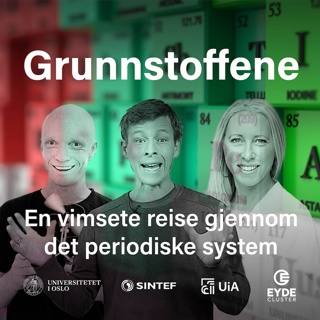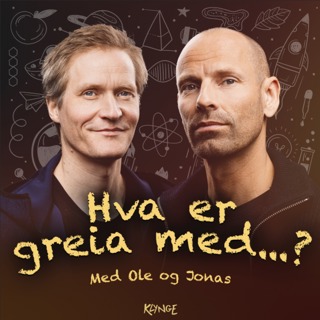
S2:E36 - MY 3 REFLECTIONS ON 2021 IN OUR FIGHT TO SAVE THIS PLANET
The final episode of 2021 and the final episode of Season 2 here on Animalia. To close things out, I’m going to share my thoughts on 3 different topics that I think are really important for everyone to understand: The 2 main things we need to do to save this planet Is “Greening” Your Life Important? The Intersection of Climate Justice, Biodiversity Collapse, and Social Justice For the only time of the year, you get no experts. No politicians. No CEOs. No scientists. Just me, your host James. I hope you can tolerate being with me for 30 minutes, lol, because I think it will be worth it! Thank you all so much for a great Season 2. Here’s to Season 3 coming March 1st 2022!
31 Des 202131min

S2:E35 (Full Version) - WHY KELP FORESTS MAY HOLD THE KEY TO THE FUTURE OF OUR FOOD SUPPLY
Today on Animalia we dive into the wonderful, critical world of Kelp! A special type of seaweed that will likely, and hopefully as you’ll learn in this episode, be a cornerstone of our future food supply. This is because Kelp is a tremendously regenerative species full of nutrition. We also really need our kelp forests, and proper, ethical kelp farming can be a big step forward in protecting them. This is because they are home to thousands of critical marine species, sequester more carbon than terrestrial forests, help improve water quality, and produce a boatload of oxygen. What is kelp farming exactly? And how do we convince more people to eat it? Joining us today is Tiffany Stephens, Chief Scientist for Sea Grove Kelp, a kelp farm in Alaska to answer all of our burning kelp questions!
18 Des 20211h

S2:E35 (5-Minute Teaser) - WHY KELP FORESTS MAY HOLD THE KEY TO THE FUTURE OF OUR FOOD SUPPLY
Welcome to the 5-minute teaser episode about kelp forests and kelp farming! If you are interested in this episode, please go and check out the full version for the in-depth conversation with Tiffany Stephens, Chief Scientist at Sea Grove Kelp. We talk about value and role of kelp forests, the future of kelp farming, and how to introduce kelp more into our diets. All a big part of our shift to a more sustainable, regenerative food system.
18 Des 20216min

S2:E34 - (5-Minute Teaser) WE CAN NOW BRING BACK EXTINCT SPECIES, BUT SHOULD WE?
This is the short, 5-minute (ish) teaser of our episode about de-extinction. Now that the technology has arrived, larger questions loom about whether or not this is a good idea, what the consequences might be good or bad, and the potential role in our biodiversity and climate crises. We have three incredible scientists joining us for this roundtable discussion: Dr. Mackenzie Kwak - parasitologist at the University of Singapore Dr. Dave Strayer - ecologist and invasive species expert at the Cary Institute Dr. Lynn Rothschild - astro biologist and evolutionary biologist at Brown University This was a fascinating and enlightening discussion that you won't want to miss! If you enjoy this teaser version, make sure to check out the full episode!
11 Des 20218min

S2:E34 - (Full Version) WE CAN NOW BRING BACK EXTINCT SPECIES, BUT SHOULD WE?
Welcome to a very special episode of Animalia. Today we are talking about the merits, ethics, and potential outcomes good and bad with de-extinction. Earlier this year, a company named Colossal announced $15M in funding to create a new hybrid wooly mammoth species with plans of reintroducing them to Siberia in hopes of reviving their grasslands. Now that the dawn of de-extinction possibilities are upon us, we need to carefully consider how this could play out, and what the positive and negative impacts on our climate and biodiversity crises could be. We have three incredible scientists joining us for this roundtable discussion: Dr. Mackenzie Kwak - parasitologist at the University of Singapore Dr. Dave Strayer - ecologist and invasive species expert at the Cary Institute Dr. Lynn Rothschild - astro biologist and evolutionary biologist at Brown University This was a fascinating and enlightening discussion that you won't want to miss! ------------ If you have not yet done so, please join our weekly newsletter. It's totally free and every Thursday we will send you 3 stories designed to be consumed in under 10 minutes that will make you a more informed advocate for this planet and addressing our climate and biodiversity crises. Go to www.joinanimalia.com/newsletter. ------------ One short edit from Dave: In the podcast, he mentioned that humans have doubled the amount of reactive nitrogen on the planet, but he asked to correct this statement as such: that we've doubled the rate of input of reactive N on the planet (i.e., we now add as much reactive N as all natural sources combined). See Figs. 8.1 and 8.2 in Weathers et al. (eds). 2021. Fundamentals of Ecosystem Science. Academic Press.
11 Des 20211h 4min

S2:E33 (Full Version) - THE CRITICAL ROLE OF CLIMATE ACTIVISTS
Today we are bringing you a very special and valuable discussion with two incredible young climate activists: Raeesah Nor Mohamed from South Africa Hussein Ali Ghandour from Lebanon Over the past few years, you've seen an uptick in protests, marches, and demonstrations from incredible people like Raeesah and Hussein from all over the world. At COP26 in Glasgow, over 100,000 activists made their way outside the event to demonstrate and push for more decisive action from world leaders. But have you had the chance to actually talk to them? To understand what motivates them to give everything they have to this issue? To sacrifice so much? To listen to their message? To step into their shoes even for a moment? Well today you do. Because Raeesah and Hussein have been kind enough to join us. I encourage you to share this episode with friends and family so they too can hear the perspectives they probably don't often get to hear, especially from uniquely challenging places in the world such as South Africa & Lebanon. And please go and follow and support them both online if you can! Raeesah on Instagram is @pure.rae.of.sunshinee and on Twitter she is @raeesahnm Hussein on Twitter is @ghandour567 Raeesah also wanted us to share a link to the Climate Justice Charter, so I encourage you all to check it out. https://www.safsc.org.za/climate-justice-charter/ --------------------------------------- From now through the end of the year, all the great merch at Animalia is 20% off. All sustainably made with details in the product descriptions, as well as every item sharing between 20 and 65% of profits with non-profit partners fighting to protect life on this planet. Go to shop.joinanimalia.com to get yours today!
1 Des 20211h 13min

S2:E32 (5-minute Summary)- USING BEER TO PUSH THE CLIMATE AGENDA FORWARD
This is the 5-minute summary version of our episode sitting down with New Belgium's Katie Wallace and how the company is pioneering ways to help save this planet, including making a rather horrible version of their flagship beer, Fat Tire, to resemble what beer may taste like if we don't get our act together. If you are interested in this short summary version, please go and check out the full episode! ----------------------------------- If you have not yet done so, please join our weekly newsletter. It's totally free and every Thursday we will send you 3 stories designed to be consumed in under 10 minutes that will make you a more informed advocate for this planet and addressing our climate and biodiversity crises. Go to www.joinanimalia.com/newsletter.
23 Nov 20217min

S2:E32 (Full Version) - USING BEER TO PUSH THE CLIMATE AGENDA FORWARD
Who knew beer could be one of our best levers in climate communications? This week on Animalia, we sit down with Katie Wallace, New Belgium's Director of Social & Environmental Impact, to discuss some of their pioneering approaches to advancing climate action, including making a rather horrible future version of what beer may taste like if we continue to destroy this planet. You probably know New Belgium from their flagship craft beer, Fat Tire. What you might not know is that the company was founded by a former social worker and all the way back in 1999, yes while we were all worried about Y2K, New Belgium was converting their electricity from fossil fuel sourced to wind. So taking action on environmental initiatives is nothing new for them. But seriously...the climate crisis beer....you'll have to hear the episode to find out more. If you have not yet done so, please join our weekly newsletter. It's totally free and every Thursday we will send you 3 stories designed to be consumed in under 10 minutes that will make you a more informed advocate for this planet and addressing our climate and biodiversity crises. Go to www.joinanimalia.com/newsletter. Here are links to a couple of the references Katie made in our chat: https://www.amazon.com/Righteous-Mind-Divided-Politics-Religion/dp/0307455777 https://www.amazon.com/Social-Conquest-Earth-Edward-Wilson/dp/0871403633
23 Nov 202150min




















